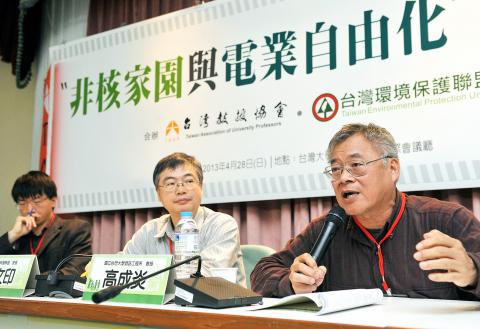The liberalization of the energy industry is a likely solution to the nation’s current disputes over nuclear energy, the root cause of which lies in the sector’s monopolization by state-owned Taiwan Power Co (Taipower), academics said yesterday.
The administration of President Ma Ying-jeou (馬英九) is insisting on raising electricity prices and ensuring the commercial operation of the Fourth Nuclear Power Plant in New Taipei City’s (新北市) Gongliao District (貢寮) “to make up for Taipower’s losses,” National Taipei University economics professor Wang To-far (王塗發) told a seminar.
The seminar, organized by Taiwan Association of University Professors and Taiwan Environmental Protection Union, was held to discuss the liberalization of the energy industry and the use of nuclear energy following the recent release of several white papers by the Executive Yuan.

Photo: Chien Jung-fong, Taipei Times
Free competition and the separation of electricity producers, distributors and sellers would “naturally rationalize the price of electricity,” Wang said.
Taipower could continue operating the nation’s nuclear power plants and hydropower stations could remain state-owned, but the rest of the market should be opened to private businesses, he said.
Citing the privatization of the nation’s telecommunications market as an example, National Chung Hsin University professor Chen Chi-chung (陳吉仲) endorsed Wang’s proposal, saying that the liberalization of the telecom market contributed to lower prices and an improvement in the protection of consumer rights.
If Taipower was in charge of electricity distribution and power plants were privatized and alternative energy promoted, the market would benefit consumers and energy efficiency would be improved, Chen said.
With regard to the debate about nuclear energy, academics said the government is misleading the public by claiming that power shortages would occur if the Fourth Nuclear Power Plant does not go into operation.
The potential risk of electricity shortages is a “flat-out lie,” Taiwan Thinktank president Wu Rong-i (吳榮義) said, adding that the nation has a reserve energy capacity of more than 10 percent “even if nuclear power was abandoned altogether.”
National Taiwan University atmospheric sciences professor Gloria Hsu(徐光蓉) said past incidents and investigations have shown that nuclear energy is “neither safe, cost-effective nor sustainable.”
“Over the long term, the development of alternative and “green” energy sources is still the best option and the cheapest,” said Chen Yen-hao (陳彥豪), an assistant researcher at Taiwan Institute of Economic Research.
Developing alternative energy sources serves two goals: the ultimate replacement of fossil fuels and the curbing of carbon emissions, he said.

Taiwan is stepping up plans to create self-sufficient supply chains for combat drones and increase foreign orders from the US to counter China’s numerical superiority, a defense official said on Saturday. Commenting on condition of anonymity, the official said the nation’s armed forces are in agreement with US Admiral Samuel Paparo’s assessment that Taiwan’s military must be prepared to turn the nation’s waters into a “hellscape” for the Chinese People’s Liberation Army (PLA). Paparo, the commander of the US Indo-Pacific Command, reiterated the concept during a Congressional hearing in Washington on Wednesday. He first coined the term in a security conference last

A magnitude 4.3 earthquake struck eastern Taiwan's Hualien County at 8:31am today, according to the Central Weather Administration (CWA). The epicenter of the temblor was located in Hualien County, about 70.3 kilometers south southwest of Hualien County Hall, at a depth of 23.2km, according to the administration. There were no immediate reports of damage resulting from the quake. The earthquake's intensity, which gauges the actual effect of a temblor, was highest in Taitung County, where it measured 3 on Taiwan's 7-tier intensity scale. The quake also measured an intensity of 2 in Hualien and Nantou counties, the CWA said.

The Overseas Community Affairs Council (OCAC) yesterday announced a fundraising campaign to support survivors of the magnitude 7.7 earthquake that struck Myanmar on March 28, with two prayer events scheduled in Taipei and Taichung later this week. “While initial rescue operations have concluded [in Myanmar], many survivors are now facing increasingly difficult living conditions,” OCAC Minister Hsu Chia-ching (徐佳青) told a news conference in Taipei. The fundraising campaign, which runs through May 31, is focused on supporting the reconstruction of damaged overseas compatriot schools, assisting students from Myanmar in Taiwan, and providing essential items, such as drinking water, food and medical supplies,

New Party Deputy Secretary-General You Chih-pin (游智彬) this morning went to the National Immigration Agency (NIA) to “turn himself in” after being notified that he had failed to provide proof of having renounced his Chinese household registration. He was one of more than 10,000 naturalized Taiwanese citizens from China who were informed by the NIA that their Taiwanese citizenship might be revoked if they fail to provide the proof in three months, people familiar with the matter said. You said he has proof that he had renounced his Chinese household registration and demanded the NIA provide proof that he still had Chinese